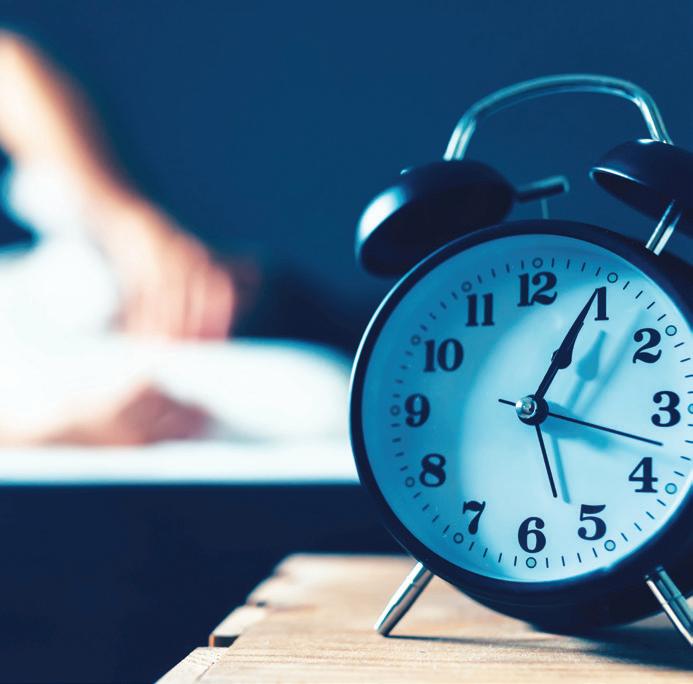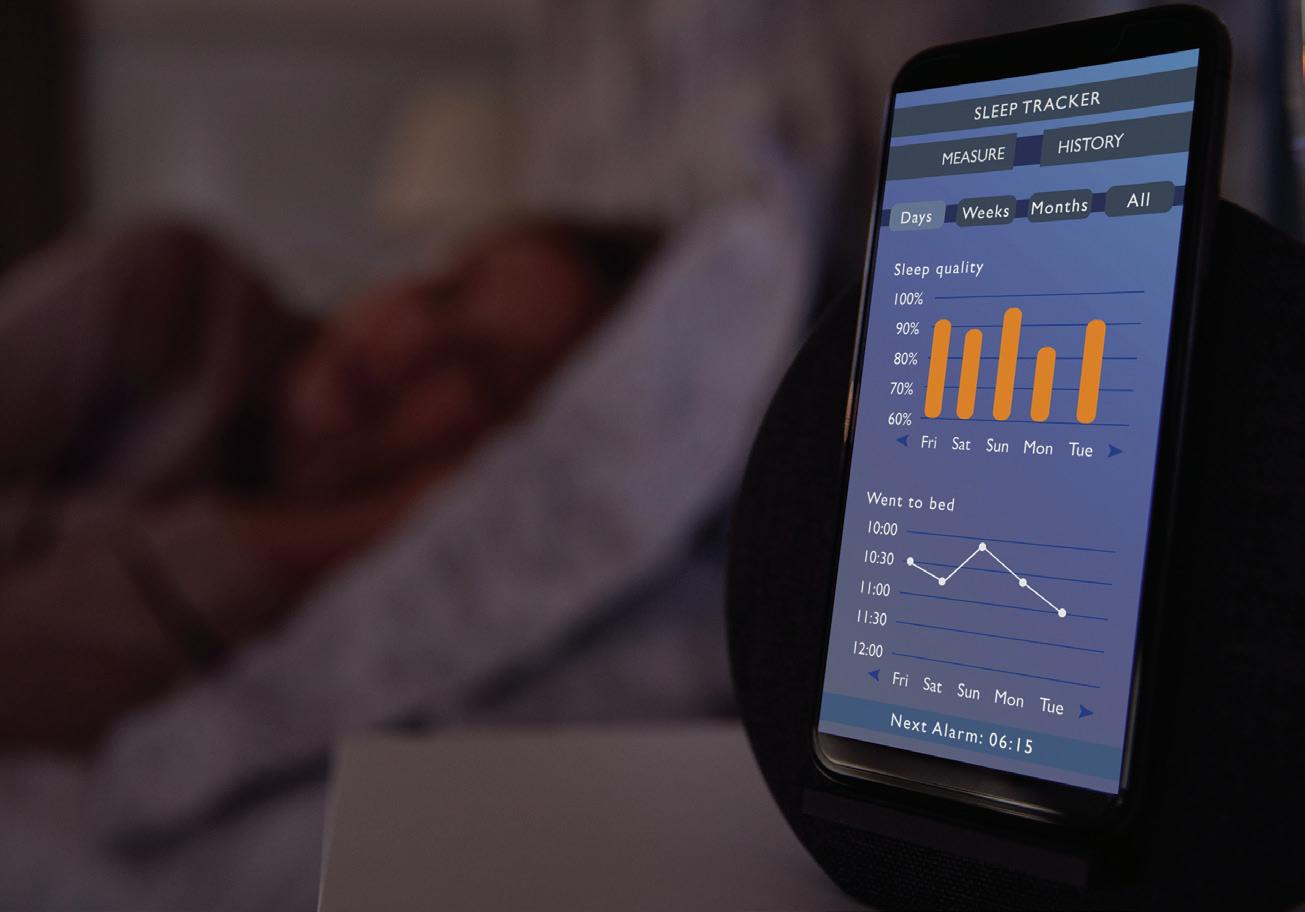
8 minute read
Let’s Talk about Sleep
When international sleep experts collaborate, the public benefits
By Gina Dewink
Pop quiz, hotshot. If someone asked you to name the three pillars of health, could you? Sure, there’s healthy food (please stop talking about kale) and then there’s exercise (can I get a New Year’s resolution) and, you’ve probably surmised by the title of this article, the third is sleep. Sound sleep, to be exact.
FROM THE SLEEP EXPERT
“There are close to 100 disorders of sleep, but most can be modified and are manageable with the help of sleep specialists,” explains Birgit Högl, MD of Austria. “Most sleep disorders are preventable or treatable, yet less than 1/3 of sufferers seek professional help. Sleep problems constitute a global epidemic that threatens health and quality of life for up to 45% of the world’s population.”
Dr. Högl is also the President of World Sleep Society. It’s a prestigious organization devoted to networking and collaborating sleep specialists and researchers from around the world. (Meaning you must be established in the sleep health community to belong to the society.)
WORLD SLEEP SOCIETY’S CONGRESS ON SLEEP MEDICINE
When sleep experts come together from over 75 countries around the world, the public benefits in three main areas: statistics, sleep awareness and international collaborations that further our understanding of sleep and its functions.
STATISTICS
Ready to worry about your quality of sleep? You probably should be. Recent studies (many completed by members of World Sleep Society and/or published in the scientific journal Sleep Medicine) show:
Individuals who get an entire night’s sleep without any interruptions experience lower rates of high blood pressure, diabetes, obesity and other chronic illnesses. Insomnia affects between 30–45% of the adult population. Primary insomnia (insomnia with no underlying condition) affects 25% of our elderly. Obstructive sleep apnea has an estimated a prevalence of 17% among men and 9% among women in the United States.
Let’s Talk About Sleep continued on page 24
BETTER SLEEP
BETTER LIFE BETTER PLANET
23
| healthiersleepmag.com
Let’s Talk About Sleep from page 23
AWARENESS
Have you ever rolled your eyes at your coworker because they’re complaining (again) about their lack of sleep? Or perhaps you’re the one being negatively affected by lack of sleep? World Sleep Society has a request:
“Be cognizant,” Dr. Liborio Parrino of the University of Parma in Italy states, “that most sleep problems can be managed by changing behaviors around sleep, medical therapy, or cognitive behavioral therapy. We hope patients suffering from sleep complaints, or who suffer from excessive daytime sleepiness, see a physician and, if needed, obtain a consultation in a sleep center. Sleep problems are no less important than other health concerns.” Dr. Parrino has also been the Chair of the World Sleep Day® Committee for the past several years.
Dr. Parrino continues, “Join participants from around the world in a global call to action about the importance of sleep each March for World Sleep Day.” Created and hosted by World Sleep Society, World Sleep Day is an internationally-recognized awareness event bringing sleep health professionals and patients together for one important common cause: Sleep.
COLLABORATIONS
Sleep is such a broad topic it can bring people together in amazing ways. During its biennial congress on sleep medicine, World Sleep Society gathers thousands of sleep professionals to hear scientific presentations led by hundreds of speakers from dozens of countries. This offers a unique lens to compare research taking place in other countries. Through international collaborations, the understanding of sleep, sleep disorders and sleep medicine is increased worldwide.
With organizations spending time, resources and funding on the study of sleep, we are able to better understand its importance in our health, as well as discover other ways to help us get a great night’s sleep. And that point just may help you sleep at night.
SAVE THE DATE
Guatemala Portugal India Hungary United Kingdom
MARCH 12, 2021
World Sleep Day is an annual event, intended to be a celebration of sleep and a call to action on important issues related to sleep. Hosted by World Sleep Society, it is a data-driven opportunity for sleep experts to inform the public about the importance of sleep in all aspects of health.
Become one of the hundreds of delegates representing over 70 countries by visiting worldsleepsociety.org/WSD.
worldsleepday.org twitter.com/_WorldSleep facebook.com/wasmf
24
| healthiersleepmag.com
Lourdes DelRosso, MD
Melissa C. Lipford, MD
Robert J. Thomas, MD
Rochelle Zak, MD
Ask the Sleep Doc As answered by our Special Issue Reviewers

Q: How do I know if I’m getting enough sleep?
Dr. Thomas
The average sleep requirement is about 7 hours, but shorter and especially longer is normal. The need to sleep in for more than 1-2 hours on an off day suggests inadequate sleep on other days, as does fatigue relieved by a nap.
Dr. Zak
Sleep needs vary from individual to individual. If you feel you are not able to function well during the day, particularly if you awaken feeling fairly refreshed, but get very sleepy later in the day, try experimenting with increasing time in bed and see if getting more sleep helps. If you awaken unrefreshed and/or having difficulty functioning regardless of total sleep time, then seeing someone to address intrinsic sleep disorders would be important.
Dr. Lipford
Most adults need between 7-9 hours of sleep nightly on a regular schedule to feel their best. If you follow this general guideline and you feel rested in the morning and energized throughout the day, you can rest assured you are obtaining sufficient sleep.
Q: How long should it take me to fall asleep?
Dr. Zak
Generally, 20-30 minutes is considered normal, but for some people, lying awake and resting for longer is not distressing and, thus, would not be considered pathologic.
Dr. DelRosso
As a rule of thumb, less than 30 minutes is considered within the normal range. However, this also depends on your “internal clock.” For example, if you are used to falling asleep by 11pm, you can expect to fall asleep within 30 minutes if going to bed at 10:30pm, but not necessarily at 9pm. It’s important your bedtime matches your natural circadian clock time.
Ask the Sleep Doc continued on page 26
25
| healthiersleepmag.com
Ask the Sleep Doc from page 25
Dr. Thomas
Anything more than 30 minutes unless your own choice (e.g., watching a movie, reading something interesting) is probably undesirable. Common reasons include too much light in the 2-3 hours prior to bedtime, and cognitively engaging or activity with high emotion content just before bedtime. All of us have a certain degree of “sleep reactivity,” or how easily our sleep is disturbed by stress.
Q: How do I know if my insomnia is environmental or something I should see a doctor about?
Dr. Thomas
Some “red flags” include insomnia not caused by an obvious trigger, persistence beyond 2-3 months, very unrefreshing sleep, bothersome daytime fatigue or daytime sleepiness, abrupt startled awakenings at night, daytime irritability which interferes with job/relationships or reduction in usual motivated behaviors and feeling depressed or anxious in the daytime.
Dr. DelRosso
I would not call it insomnia until you have been evaluated by a sleep specialist. There are many contributors to difficulty falling asleep. Easy to target environmental causes include: noise, temperature, light and other disruptors at home (smaller children crying, bed partner moving or snoring, among others.)
Dr. Lipford
Many of us experience temporary insomnia in the setting of stressful life events. Environmental factors can also trigger insomnia (like a noisy bedroom environment, or a partner/roommate who keeps different hours than you). If your symptoms persist, check in with your healthcare provider. They will review your medical and sleep history and may recommend additional tests.
Q: What are some ways to fall back to sleep if I awaken in the night?
Dr. Lipford One of the most frustrating aspects of insomnia is the harder you try to fall back asleep, the more your mind resists falling asleep. Trying relaxation methods (such as meditation, deep breathing or guided imagery) help calm the mind and allow drowsiness to build.
26
| healthiersleepmag.com

Dr. Thomas
A common mistake is spending too much time in bed, in part “trying to catch up” for lost sleep. This extra time will reliably make it harder to fall asleep after a major awakening. Other disruptive things to do are eating, light exposure, physical activity or trying to “get some work done.” Sleep is also naturally NOT continuous, so be tolerant to some brief awakenings. Long durations of wake (30-60 minutes) need to be addressed. If you routinely spend time in bed worrying, leave the bed until you feel sleepy and return when ready to sleep to break an association of being awake, rather than sleep, with the bed.
Dr. Zak
The first thing to do is to try to be patient with yourself. A bad night’s sleep is not optimal, but is also not a disaster. Trying to put in perspective your need to return to sleep can help with relaxation and the ability to fall back asleep. Secondly, you will likely feel that your bladder is full, so do use the bathroom and when you return to your bed, begin your usual pre-sleep routine. For some people, it can include slow deep breathing and muscle relaxation, for others it can be listening to relaxation apps or calming music.
Dr. DelRosso
Do not turn the lights on or start checking electronics. Get comfortable, be sure your environment is not too hot or too cold; be in a comfortable position. If you can’t sleep after 30 minutes, get up and read a book (if close to getting up time get up and start your day, avoid a nap the next day).









